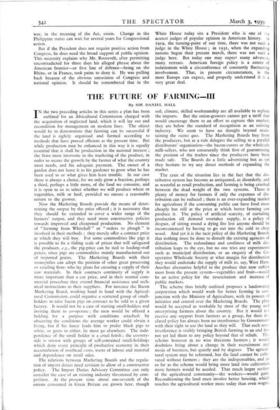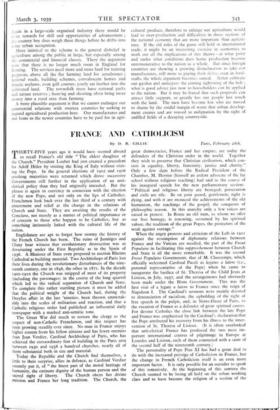THE FUTURE OF FARMING
By SIR DANIEL HALL
IN the two preceding articles in this series a plan has been outlined for an Africultural Commission charged with the acquisition of neglected land, which it will lay out and recondition for management on modern lines. The object would be to demonstrate that farming can be successful if the land is rightly organised and farmed according to methods that have proved efficient at the present time. But while production may be enhanced in this way it is equally essential that it shall be production in the national interest ; the State must intervene in the marketing of the produce, in order to secure the growth by the farmer of what the country most needs, and his adequate payment. The owner of a garden does not leave it to his gardener to grow what he has been used to or what gives him least trouble. In our case there is always a choice, for we only grow a fraction, perhaps a third, perhaps a little more, of the food we consume, and it is open to us to select whether we will produce wheat or vegetables, milk or beef, provided we ensure a reasonable return to the grower.
Now the Marketing Boards provide the means of deter- mining the output by the price offered ; it is necessary that they should be extended to cover a wider range of the farmers' output, and they need more constructive policies towards improved and cheapened production. No element of " farming from Whitehall " or " orders to plough " is involved in their methods ; they merely offer a contract price at which they will buy. For some commodities like pigs it is possible to fix a sliding scale of prices that will safeguard the producer, e.g., the pig-price can be tied to feeding-stuff prices, since pigs are commodities mainly manufactured out of imported grains. The Marketing Boards with their monopolies can adopt the position of other great processing or retailing firms who lay plans for ensuring a supply of their raw materials. In their contracts continuity of supply is more important than a cut price, and in their normal com- mercial procedure they extend financial assistance and tech- nical instructions to their suppliers. For instance the Bacon Marketing Board, working hand in hand with the Agricul- tural Commission, could organise a scattered group of small- holders to raise bacon pigs on contract to be sold to a given factory. It would not be a case of starting small-holders and inviting them to co-operate ; the men would be offered a holding for a purpose with conditions attached; by observing the conditions the average worker could obtain a living, but if his fancy leads him to prefer black pigs to white, or goats to either, he must go elsewhere. The inde- pendence of the small holder is a cruel fetish ; the country- side is strewn with groups of self-contained small-holdings which deny every principle of productive economy in their accumulation of overhead costs, waste of labour and material and dependence on retail sales.
The relations between Marketing Boards and the regula- tion of import duties need revision to allow of a constructive policy. The Import Duties Advisory Committee can only consider the case of an existing industry threatened by com- petition. At the present time about one-seventh of the onions consumed in Great Britain are grown here, though soil, climate, skilled workmanship are all available to replace the imports. But the onion-growers cannot get a tariff that would encourage them to an effort to capture this market; they are below the standard of recognition as an existing industry. We seem to have no thought beyond main- taining the status quo. The Marketing Boards buy from the producers, but as a rule delegate the selling to a parallel distributors' organisation—the bacon-curers or the wholesale milk-sellers, who not unnaturally think first of guaranteeing the position of the traders since the producers have been made safe. The Boards do a little advertising but as yet they hesitate to try any direct methods of expanding the market.
The crux of the situation lies in the fact that the dis- tributive system has become as antiquated, as disorderly, and as wasteful as retail production, and farming is being crushed between the dead weight of the two systems. There is plenty of money for farmers if only the expenses of dis- tribution can be reduced ; there is an ever-expanding market for agriculture if the consuming public can have food more cheaply but still at the price at which better farming can produce it. The policy of artificial scarcity, of curtailing production till demand overtakes supply, is a policy of despair, of sitting round a dying fire lest anyone should be inconvenienced by having to go out into the cold to chop wood. And yet it is the tacit policy of the Marketing Boards that nothing must be done to disturb the existing agencies of distribution. The redundance and costliness of milk dis- tribution leaps to the eye, but no one tries any experiments such as municipal distribution, or an enquiry of the Co- operative Wholesale Society at what margin for distribution they would undertake the supply of milk to, say, West Ham. Another alternative helpful to the produce that now suffers most from the present system—vegetables and fruit—would be an active policy for the resuscitation and increase of public markets.
The scheme thus briefly outlined proposes a landowning corporation which would work for better farming in con- junction with the Ministry of Agriculture, with its powers of initiative and control over the Marketing Boards. The plan would be accepted as workable by most of the young and enterprising farmers about the country. But it would not receive any support from farmers as a group, for their de- clared policy has always been no interference by Government with their right to use the land as they will. That such non- interference is visibly bringing British farming to an end has not yet led them to any policy beyond that of reliefs. Th.= scheme however in no wise threatens farmers ; it would doubtless bring about a change in their recruitment and mode of business, but quietly and by degrees. The agricul- tural system may be reformed, but the land cannot be culti- vated without farmers ; they are the indispensables, and in so far as the scheme would bring more land into cultivation more farmers would be needed. That much larger section of the agricultural community—the workers—would gain. Reconditioning the land must involve better housing, which touches the agricultural worker more today than even wages. :.gain in a large-scale organised industry there would be nl,tre rewards for skill and opportunities of advancement ; the country boy does weigh these things before he drifts into some urban occupation.
More inimical to the scheme is the general disbelief in agriculture among the public at large, but especially among the commercial and financial classes. There the argument runs that there is no longer much room in England for farming. The services need more and more land for training purposes, above all the flat farming land for aerodromes ; national roads, building schemes, convalescent homes and lunatic asylums, even golf courses, yearly eat further into the cultivated land. The townsfolk must have national parks and nature reserves ; hunting and shooting often bring more money into a rural area than farming.
A more plausible argument is that we cannot endanger our commercial relations with oversea countries by seeking to expand agricultural production here. Our manufactures and our loans to the newer countries have to be paid for in agri- cultural produce, therefore to enlarge our agriculture would lead to over-production and difficulties in those sections of the national economy that are more important than agricul- ture. If the old rules of the game still held in international trade, it might be an interesting exercise in economics to work out all the implications of this theory—at what point and under what conditions does home production become unremunerative to the nation as a whole. But since foreign countries are showing a growing disinclination to take our manufactures, still more to paying their debts, even in food- stuffs, the whole argument becomes unreal. Better cultivate our garden and anticipate the coming tightening of the belt ; what is good advice just now to householders can be applied to the nation. But it may be feared that such proposals can attract little support, so greatly has our people lost touch with the land. The men have become few who arc moved to shame by the sordid margin of waste that urban develop- ment creates and are roused to indignation by the sight of unfilled fields of a decaying countryside.



























































 Previous page
Previous page